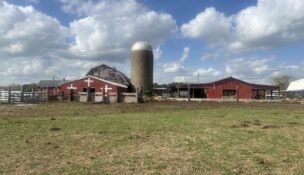Opportunity Virginia website launches
Kate Andrews //October 22, 2019//
A new website geared toward matching small property and business owners in Virginia with big-time investors officially launched Tuesday with an announcement from Gov. Ralph Northam.
Under development since April, Opportunity Virginia lists potential opportunity zone projects, designated low-income areas that carry federal, state and local tax incentives, including tax deferral, tax reduction through long-term investment and exclusion of certain capital gains tax. The opportunity zones are located on land tracts approved last year by the U.S. Treasury as part of the 2017 federal Tax Cuts and Jobs Act.
“As governor, one of my highest priorities is ensuring that every Virginian has access to a good job and the skills to be successful, no matter who you are or where you’re from,” Northam said in a statement. “This initiative will help Virginia use the Opportunity Zone tax incentive program created by Congress almost two years ago to bring needed investment to important projects being developed across the commonwealth. We are focused on pursuing economic growth that is inclusive and equitable, not just market-driven, and this partnership will bolster our efforts to improve economic opportunity for people in communities that have traditionally been underserved.”
Virginia has 212 opportunity zones, and right now, says Opportunity Virginia Executive Director Adam Northup, there are about 150 development ideas “in the pipeline” statewide that would qualify. Many need financial backing to move forward.
“We’re seeing a nice mix of rural and urban,” Northup says. “That’s all very positive. The challenge is that 20 [projects] maximum are ready for discussions with investors. There’s quite a bit of work to get the investments to that stage.”
Virginia Community Capital and LOCUS Impact Investing launched the site with help from Opportunity Exchange, a Cleveland-based consulting firm that helps communities create opportunity zone websites to help connect investors with land owners in federally designated opportunity zones.
In early 2018, the Virginia Department of Housing and Community Development (DHCD) and the Virginia Economic Development Partnership (VEDP) contacted each city and county administrator in the state to prioritize local land tracts that qualified to be opportunity zones. To qualify, a land tract had to be in an area where either 20% or more of the population was living below the poverty line or 80% or more of the population had a lower median income than surrounding land tracts, according to the U.S. Census Bureau’s 2015 and 2016 American Community Surveys.
In Virginia, there were 901 qualifying tracts, and the state could nominate no more than 212 tracts. After localities sent their surveys to the DHCD and VEDP, the governor’s office made its nominations. The U.S. Treasury Department approved all 212 nominations in June 2018. This year, representatives from DHCD and Opportunity Virginia explained the opportunity zone process at workshops and town halls across Virginia.
Kristen Dahlman, a senior policy analyst at DHCD who ran the “war room” collecting localities’ recommendations for opportunity zones, says the Opportunity Virginia website is run by four staff members “educating people and connecting investors with projects.” The federal program doesn’t have a reporting requirement, which would allow states and localities to see how opportunity zones are benefiting residents, so the website serves as a record of the projects, she says.
One significant point is that in order to receive the maximum 15% tax reduction, opportunity zone projects must be approved by local planners by the end of 2019. If they wait until 2020, investors in the projects will receive only 10%. The Dec. 31 deadline is very important to smaller investors to whom the extra 5% in tax incentives matters more, Northup says.
“I’m observing a certain kind of investor class that is rushing to get the money in,” he says. “I am seeing some patience too. The cool part of this program is you can combine any kind of incentives you want.” For instance, if a developer invests in a historic building that’s in a state-designated Enterprise Zone that provides local and state tax relief, the developer could benefit from historic tax credits plus incentives connected with opportunity zone and Enterprise Zone programs.
Depending on what incentives are available, says Northup, an investor could receive up to 50% in tax breaks.
As for the Dec. 31 deadline, Dahlman says, “there was kind of this panic at the beginning of the year, but not as much now. I don’t think it’s going to slow down at all.”
Opportunity zones cover the whole state — and that’s by design, Northup says. They have many different characteristics, from big metropolitan cities to coal land in Southwest Virginia. In the city of Richmond, the booming Scott’s Addition neighborhood, which is filling fast with breweries, restaurants and high-end apartments, is an opportunity zone. So is the plot of land where the $1.5 billion Navy Hill/Coliseum project has been proposed north of Broad Street.
Susan Eastridge, CEO of Fairfax-based development company Concord Eastridge and one of the master developers of the Navy Hill project, came up with the idea 3 1/2 years ago, she says.
“The Coliseum was functionally obsolete,” Eastridge says. “Also, the land [around it] wasn’t being used. There’s kind of this dead zone. We started studying it from a real estate perspective.” During the process, Eastridge and her business partner, Michael Hallmark of Future Cities, got to know local leaders, including Dominion Energy CEO Tom Farrell, who leads the NH District Corp., which is heading up the proposed Navy Hill redevelopment project.
Because their project dated before the Opportunity Zone program, Eastridge says the tax incentives don’t have a big effect on their plans, but it would impact those of minority investors — likely local business owners who might locate near the development.
“Our timing is tight, and it’s dependent on the [Richmond] City Council,” says financial adviser Greg Derby, principal of Story Street Advisors LLC, who is working with Concord Eastridge. Eastridge says that if the Council takes its full 90-day review period, which is being conducted by a commission named in early October, it could vote Dec. 23, eight days before the deadline.
Nationally, the opportunity zone program has come under scrutiny for benefiting wealthy investors who aren’t necessarily helping disadvantaged communities produce new jobs and businesses. An August New York Times article describes fancy projects in already hot neighborhoods in Houston, Miami and New Orleans, some backed by friends and advisers of President Trump.
Investors’ money is “going to those places like Scott’s Addition,” says Dave McCormack, the Petersburg-based developer and owner of Waukeshaw Development, which specializes in adaptive reuse of historic buildings. “There seems to be very little interest in using the zones for their intended purpose” — propelling development in underdeveloped, impoverished areas. “Instead, it’s an added incentive to be in an area that is already hot.”
Adds McCormack: “It’s difficult to [imagine] a scenario where one would make a decision on an investment in a disadvantaged community based solely on the [opportunity zone]. It’s too niche, and the underserved areas also don’t have a market solid enough to get investors the return they would expect to make it worthwhile.”
However, Northup says that about 25% of the 150 potential opportunity zone projects he’s learned about are in Danville and Martinsville, and others listed on the Opportunity Virginia site are in Harrisonburg and Bristol.
“Virginia took a very deliberate approach,” Northup says. “They really wanted the localities to stand up and say, ‘Hey, catalytic impact.’ Maybe there is already investment and stuff going on.”
i


















